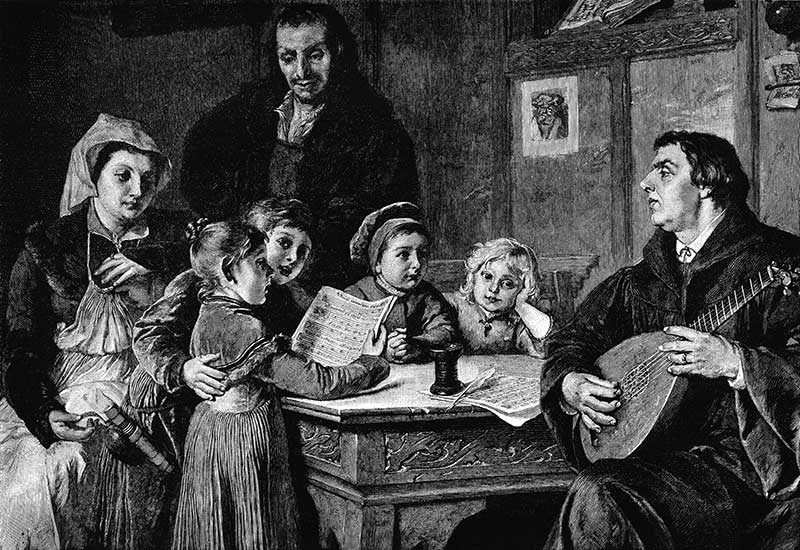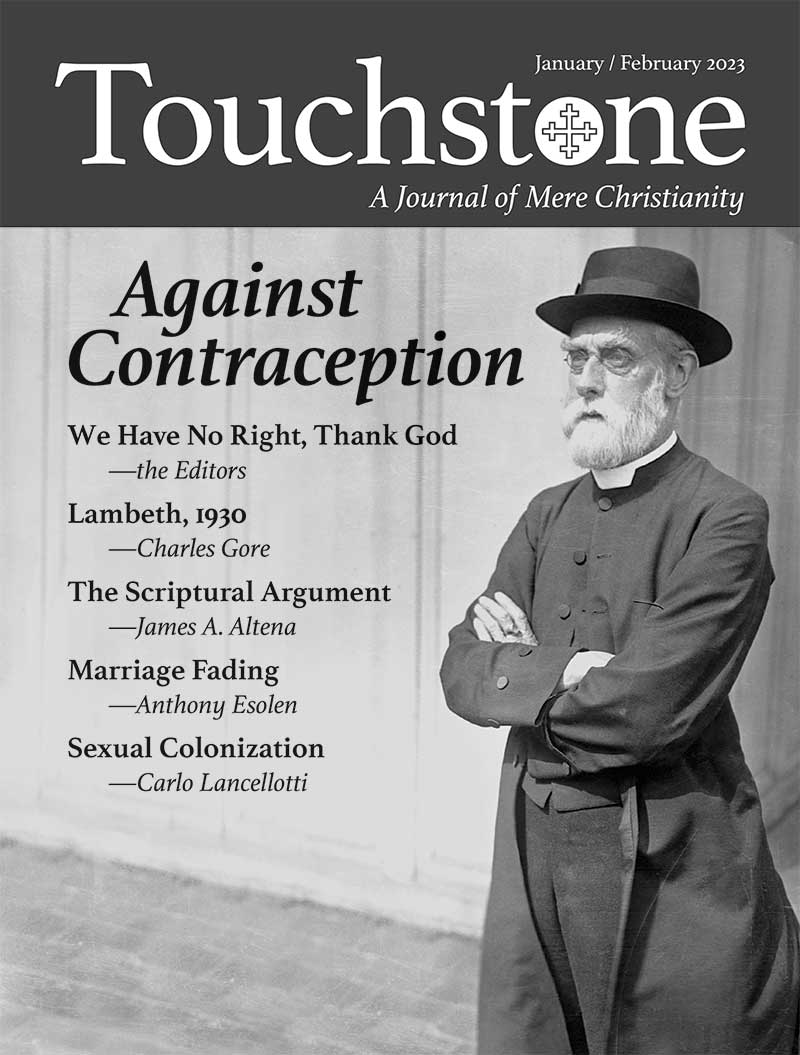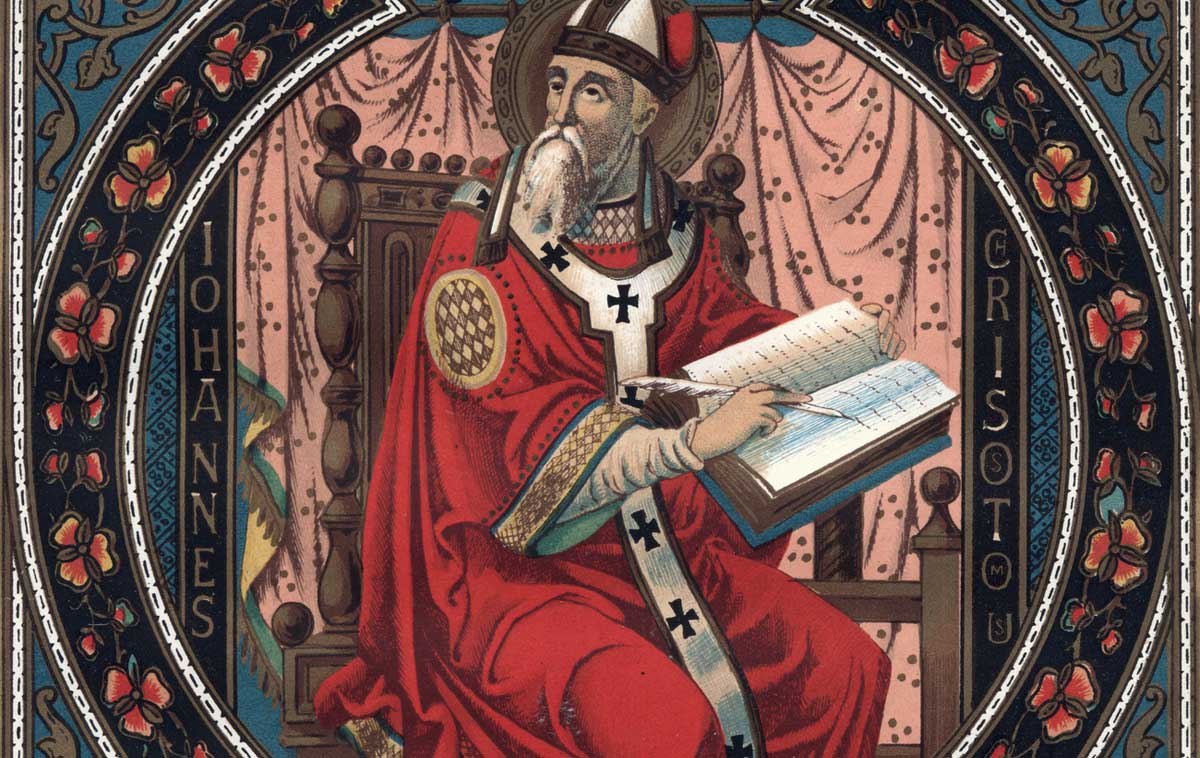Contraceptive Cons
A History of the Protestant Debate over Contraception
May Christians utilize intentional forms of contraception? On few other ethical issues do Protestants remain as strongly divided. This is due in good part to the fact that, apart from the episode of Onan (Gen. 38:1–11), the practice is not mentioned in Scripture. Consequently, arguments pro and con are made inferentially from more general biblical principles. Anti-contraceptionists point to the repeated biblical injunction to “be fruitful and multiply” as the essential principle governing marital coitus; pro-contraceptionists stress other aspects of the marital bond, gospel liberty, and prudential considerations of stewardship.
In virtually all of the various arguments, however, one central issue dominates: Is propagation, by divine ordination and design, the sole or principal and irreducible purpose of marital coitus? Or are other purposes of equal or even greater importance, not merely distinct from procreation but autonomous ends that may be pursued in their own right? As a convinced Protestant, I will argue here that the patterns of both scriptural and general revelation point to all intentional uses of contraception, whether mechanical or chemical, as fundamentally violating the principles governing the creation ordinance for propagation, and hence those governing the right uses of sexual relations within marriage.
Uniform Condemnation
Several different rationales have been presented over the centuries as the proper scriptural purposes of marriage. The fathers and medieval scholastics unanimously denounced contraception as a heinous sin and considered procreation within wedlock the only licit reason for coitus; Augustine further restricted relations to times of maximum fertility and considered taking pleasure in the act a venial sin.
The Protestant Reformers conceived the purposes of marriage more broadly. The liturgy for “The Solemnization of Matrimony” in the 1549 and subsequent editions of the Anglican Book of Common Prayer, which many other English-speaking churches adapted for their own use, identifies three “causes for which Matrimony was ordained”: “procreation of children,” “a remedy against sin, and to avoid fornication” (1 Cor. 7:2), and the “mutual society, help, and comfort” of man and wife (Gen. 2:18; Prov. 5:18–19; Eccl. 9:9). The 1646 Westminster Confession of Faith similarly identifies marriage as being ordained for “the mutual help of husband and wife,” legitimate procreation, and the “preventing of uncleanness.” The discussion of the Sixth Commandment (the Seventh for other Protestants, as in this essay) in the Lutheran Book of Concord also stresses procreation, stating that God instituted the estate of matrimony so that a man and woman might “live together, be fruitful, beget children, and nourish and train them to the honor of God.”
However, the Reformers also abominated contraception. Luther averred of Onan’s act of coitus interruptus that “we call it unchastity, yes a sodomitic sin,” while Calvin in his commentary on Genesis termed it murder and set the traditional Reformed standard:
The purposeful spilling of semen outside of intercourse between man and woman is a monstrous thing. Purposely withdrawing from coitus, so that the seed drops on the ground, is twice as horrific. For this is to extinguish the hope of the human family and to kill before he is born the hoped-for offspring. This wickedness is here condemned by the Spirit in the most severe manner possible. . . . When a woman in some way expels the seed out of the womb, using drugs, then this is rightly seen as an unforgivable crime; and Onan rightfully incurred upon himself the same kind of punishment. . . .
Numerous Lutheran, Reformed, Anglican, Methodist, Congregationalist, and Anabaptist theologians likewise denounced contraception—a short list of famous names from the sixteenth to eighteenth centuries includes (among many others) Henry Ainsworth, Abraham Calovius, Johann Gerhard, John Gill, Matthew Henry, Franciscus Junius, Wolfgang Musculus, David Pareus, Matthew Poole, André Rivet, Jeremy Taylor, James Ussher, and John Wesley. So too did the Synod of Dort, and the eleven Puritan divines headed by William Gouge who produced The Westminster Annotations and Commentary on the Whole Bible (John Ley being the commentator on the Pentateuch, including on the sin of Onan).
The Roman Catholic Church likewise maintained absolute opposition to contraception, though the landmark 1968 papal encyclical Humanae vitae broadly distinguishes two chief but conjoined aspects of marriage as procreative and unitive, with the latter being an expression of the former.
The Dam Ruptures
James A. Altena is the associate editor of Fanfare magazine, a comprehensive bimonthly periodical for reviews of classical music recordings. He is a member of All Saints Episcopal Church in Wynnewood, Pennsylvania, and is pursuing a Ph.D. in church history at Westminster Theological Seminary in Glenside, Pennsylvania.
subscription options
Order
Print/Online Subscription

Get six issues (one year) of Touchstone PLUS full online access including pdf downloads for only $39.95. That's only $3.34 per month!
Order
Online Only
Subscription

Get a one-year full-access subscription to the Touchstone online archives for only $19.95. That's only $1.66 per month!
bulk subscriptions
Order Touchstone subscriptions in bulk and save $10 per sub! Each subscription includes 6 issues of Touchstone plus full online access to touchstonemag.com—including archives, videos, and pdf downloads of recent issues for only $29.95 each! Great for churches or study groups.
Transactions will be processed on a secure server.
more on family from the online archives

31.5—September/October 2018
Errands into the Moral Wilderness
Forms of Christian Family Witness & Renewal by Allan C. Carlson
more from the online archives
calling all readers
Please Donate
"There are magazines worth reading but few worth saving . . . Touchstone is just such a magazine."
—Alice von Hildebrand
"Here we do not concede one square millimeter of territory to falsehood, folly, contemporary sentimentality, or fashion. We speak the truth, and let God be our judge. . . . Touchstone is the one committedly Christian conservative journal."
—Anthony Esolen, Touchstone senior editor












